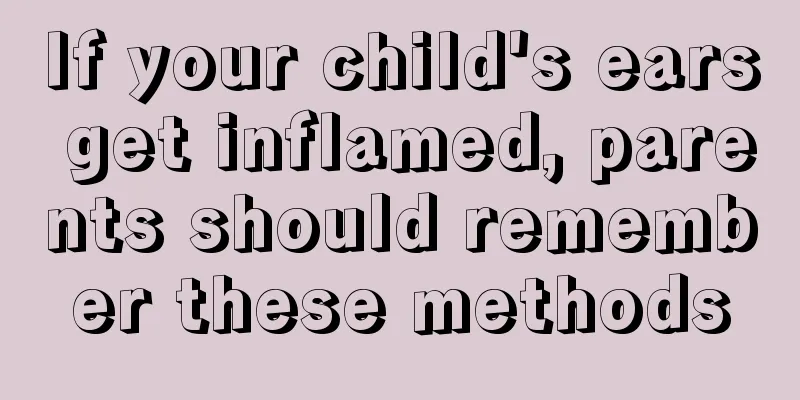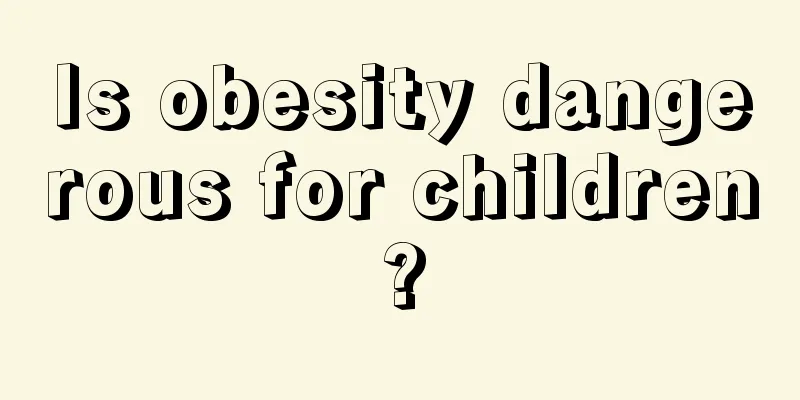If your child's ears get inflamed, parents should remember these methods

|
The inside of a child's ear is relatively fragile. If water gets into the ear, it can easily become inflamed. Therefore, it is very important to drain the water in time. If symptoms of inflammation appear, parents must pay attention. Here we will teach you how to deal with it. 1. Open your mouth repeatedly to promote drainage If water gets into the baby's ears while bathing, you should first place the baby on his side on your thighs, with the ear that has water facing downward. Press the baby's ear base tightly with your palm, then quickly release the pressure several times to "suck" the water out. Or you can gently press the baby's lips with your fingers to induce him to open his mouth, repeat this several times to activate the temporomandibular joint and encourage water to flow out of the external auditory canal. 2. Follow the doctor's advice to drop medicine and control inflammation What should I do if my baby’s ears get inflamed? For simple otitis externa, first clean the external auditory canal with 3% hydrogen peroxide solution and wipe it dry with a sterilized cotton swab. Then apply ofloxacin ear drops to the affected ear 3 times a day, and the inflammation can be controlled after a few days. Pay attention to medication and follow doctor's orders 3. Use antibiotics with caution What should I do if my baby has an ear infection? In most cases, antibiotics are not needed for treatment. Sometimes your doctor will decide whether general care or medication is needed based on the situation. For children aged two to twelve, antibiotics are usually recommended only if acute otitis media is confirmed or if the child's infection is very severe. 4. If you accidentally get otitis media, you should seek timely treatment Symptoms: Parents must pay attention to their baby's behavior to see if he has ear pain or pus discharge when he has a cold. If your baby has otitis media, if it is relatively mild, he will usually make noises, shake his head, scratch his ears with his hands, etc. If it is more serious, he will have a high fever and yellow fluid will flow from his ears. When children suffer from otitis media, the main symptoms are ear pain and congestion of the eardrum. In severe cases, children may also develop suppuration or even perforation of the eardrum. Parents should pay attention to their baby's hearing performance on a daily basis. If there are any abnormalities, they should seek medical attention as soon as possible to avoid delaying treatment and worsening the condition. Tip: If otitis media is treated promptly, it can usually be cured in 3-4 days. If not treated promptly, it will damage hearing and in severe cases may lead to permanent deafness. 5. How to prevent water from entering your baby’s ears When washing your baby's hair, use a special baby shampoo cap to prevent water from flowing into the baby's ears and eyes; do not let the baby lie down to drink milk or water; when the baby lies down and cries, wipe his eyes in time and pay attention to whether the tears flow into his ears; when bathing the baby, it is very common for water to enter the baby's external auditory canal. Parents should pay attention to taking a clean cotton swab to clean it. Never use your hands or other instruments such as ear spoons to dig directly to avoid breaking the skin and causing infection. It is best to use two soft cotton balls and place them on the external auricle for about 3-5 minutes, and the water will be absorbed into the cotton balls. Water entering the external auditory canal can at most cause otitis externa or inflammation of the outside of the eardrum, but it will not cause otitis media. |
<<: What is the reason for children's sleepiness? It turns out to be these 4 points
>>: The child is twitching, rolling his eyes and having purple lips. This may be epilepsy.
Recommend
Why is my child losing a piece of hair?
We know that sometimes we lose hair one by one, n...
What are the symptoms of pediatric dermatitis?
Nowadays, many children have symptoms of dermatit...
What are the symptoms of autism in children
If autistic children are not discovered and treat...
What are the adverse reactions to measles vaccination in children?
Parents who take their children to get the measle...
What should babies eat if they have lung heat and cough?
As the weather becomes drier in autumn and winter...
What are the methods for children to eat bird's nest
Children’s physique is very fragile. From a tradi...
What complementary foods are there for babies aged five or six months?
Some people say that it is cruel for a mother to ...
Can you still grow taller after development?
In daily life, we often see many girls showing pr...
What are the symptoms of rice intolerance in babies?
Since birth, babies need careful care from their ...
How to treat children snoring when sleeping
Many parents often find that their children snore...
What's a good way to make babies love drinking water?
In fact, many people are more concerned about the...
Newborn's neck always tilted back?
In daily life, most babies’ necks will tilt back ...
What should I do if my child has a cold and fever repeatedly?
Some children have caught a cold and had a fever....
What foods are good for children's teeth
Childhood is the period when teeth grow most freq...
What should I do if my child has a high fever and red spots on his body?
Children at home often have fever. At this time, ...









